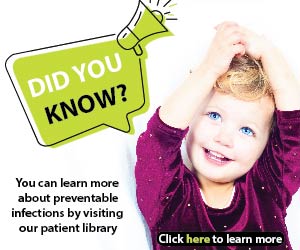Healthy Kids Today Because of Yesterday

“Vaccines and immunizations are clear success stories. Yet, because vaccines are so successful at preventing disease, the public often takes them for granted.”1
- Museum of Healthcare at Kingston
Just how quickly do we forget the devastation some illnesses can leave in their wake? Remember the Iron Lung? Like poliomyelitis, the illness it was used to treat, the Iron Lung seems like relic of days gone by. Yet some of the children of the early 1950s who survived the polio epidemic are still around to tell the tale of their own experience with this lifesaving device. Thanks to the effectiveness of a widely adopted vaccination program, today polio is largely forgotten instead of feared.1
The opening quotation is from an online exploration1 of several key vaccines and the deadly and/or disabling diseases they prevent, including polio. It builds on a physical exhibit mounted in 2013 at the Museum of Health Care in Kingston, Ontario. The relative rarity of many contagious illnesses in Canada is thanks in part to the protection that comes with widespread immunization. When enough members of a community are vaccinated, the spread of contagious germs is limited and outbreaks are unlikely to occur – this is known as herd immunity.
When people become complacent and no longer observe vaccine recommendations, their community (think herd) can lose that level of protection. This has been the case recently with measles – once a common and very contagious disease, measles was declared eliminated in Canada in 2002 and in the U.S. in 2000. Less than 10 years later, in 2011, Quebec experienced a significant outbreak that spread to more than 750 people – mostly children – by the time it had run its course. The majority of those affected had not been vaccinated.2
Recent research into rotavirus – the most common cause of diarrhea in babies – supports the validity of herd immunity. A U.S. study of rates of rotavirus before and after widespread use of the vaccination concluded that use of rotavirus vaccines has substantially reduced use of healthcare for diarrhea in US children. Rotavirus vaccines were associated with a high level of protection against rotavirus hospitalizations, and provided indirect benefits to unvaccinated children.3 The same two rotavirus vaccines are available in Canada are in liquid form and taken by mouth.4
Did you know?
December 2013 saw the introduction of Bexsero, the first broad coverage vaccine against meningococcus B, which has become a significant cause of outbreaks of invasive meningococcal disease (IMD). This vaccine offers the potential to prevent all major causes of bacterial meningitis outside of the newborn period. Who can benefit? Children from two months through 17 years of age, and the people who love them. Meningitis vaccination is especially important for anyone who travels outside of Canada.5
Kids’ 3 Key Vaccinations4
One MMR vaccine - 2 doses
- When: between 12 and 18 months of age (at least 1 month apart) or
- at 12 months of age, and before entering school (between ages 4 to 6).
Two Rotavirus vaccines – 2 or 3 doses
- 2 doses Rotarix or 3 doses RotaTeq, at least 4 weeks apart
- When: between 6 and 32 weeks (8 months) of age; 1st dose before 15 weeks of age4
Three Meningitis vaccines (MCV-C, MCV-4 and 4CMenB) – 2 doses
- When: between 2 to 12 months of age, and in adolescence (booster dose of MCV-4 or MCV-C)
Want to learn more?
Visit the Museum of Healthcare online to see the Iron Lung and much more at: http://www.museumofhealthcare.ca/explore/exhibits/vaccinations/
Or the Centers for Disease Control and Prevention to find out: What would happen if we stopped vaccinations?
Brought to you by Vaccines411.ca – know where to go for your vaccinations.
This information should not be used as a substitute for the medical care and advice of your doctor. There may be variations in treatment that your physician may recommend based on individual facts and circumstances.
Read more Vaccines411® Articles 
Sources
Note: the hyperlinks that direct to other sites are not continuously updated. It is possible that some links become untraceable over time. Thank you.
- Vaccines & Immunization: Epidemics, Prevention & Canadian Innovation, The Online Exhibit
http://www.museumofhealthcare.ca/explore/exhibits/vaccinations/ - Quebec battling major measles outbreak
http://www.cbc.ca/news/canada/montreal/quebec-battling-major-measles-outbreak-1.990990 - Rotavirus Vaccines and Health Care Utilization for Diarrhea in the United States
http://pediatrics.aappublications.org/content/134/1/15 - Caring for Kids: Illnesses & Infections
http://www.caringforkids.cps.ca/handouts/illnesses-index - Bexsero
http://www.hc-sc.gc.ca/dhp-mps/prodpharma/sbd-smd/drug-med/sbd_smd_2014_bexsero_147275-eng.php



